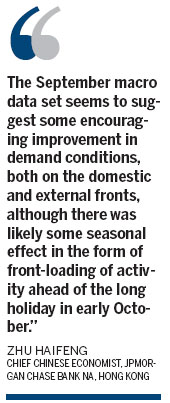Economic outlook brightens for China
Updated: 2012-10-29 01:46
By Chen Jia (China Daily)
|
|||||||||||
The government is likely to keep policies stable in the rest of 2012
Chinese economists bet that the central government may slow the pace of releasing new stimulus policies for boosting economic growth in the fourth quarter because recent indicators show the economy is warming up and global demand is expected to rebound moderately.
Top policymakers have shown a cautious stance on taking further steps to ease fiscal and monetary policies, learning lessons from the rushed 4 trillion yuan ($630 billion) investment package four years ago.
|
 |
|
The central government is easing its policy to support the pickup in public investment in areas such as infrastructure, railways, environmental protection and clean energy and make them the main drivers to boost economic growth in the fourth quarter. [Photo/China Daily] |
Even though a change in the country's top leadership is going to take place at the 18th National Congress of the Communist Party of China, which is scheduled to open on Nov 8, macroeconomic policies will likely remain stable for the rest of this year, analysts said.
Their comments are based on a recent favorable turn in the economic outlook. After seven sequential quarterly declines, the world's second largest economy started to show positive changes based on the effects of the previous easing measures.
The growth in China's gross domestic product continued to slow in the third quarter to 7.4 percent from a year ago, down from the 7.6 percent year-on-year rate in the second quarter, according to the National Bureau of Statistics data released on Oct 18.
Weakened global demand was the main force in dragging down expansion. In the first three quarters, net export value lowered the whole GDP by 0.4 percentage points, contributing a negative 5.5 percent to growth, according to the data.
"Domestic demand, which consists of consumption and investment, will be the engine to cause the economy to rebound," said Pan Jiancheng, deputy director-general of the bureau's China Economic Monitoring and Analysis Center.
Domestic consumption accounted for 55 percent of GDP, driving growth up by 4.2 percentage points in the first nine months. Investment accounted for 50.5 percent of the increase, or 3.9 percentage points, the bureau said.
Wang Tao, chief economist in China with UBS AG, said the risk of economic slowdown has decreased, supported by the previous fine-tuning, and the global situation may remain stable in the fourth quarter.
"September's economic indicators have suggested a moderate rebound," Wang said.
 |
One of the good signals was the monthly released indicator of the operational activities in the manufacturing sector — the Purchasing Managers' Index. It rose to 49.8 in September from 49.2 in August, which means the manufacturing industry was still contracting but at a slower pace. A reading above 50 means expansion while that below 50 shows contraction.
A sub-index of new orders rose to 49 in September, 1.1 points higher than the August figure, which was the main driver of the PMI, reflecting a moderate rebound in demand, according to the official data.
In terms of industrial production, output rose 9.2 percent in September from a year earlier, compared with 8.9 percent in August. Western China experienced the fastest pace in producing industrial goods with a reading of 12.4 percent. The September year-on-year figures were 9.5 percent in Central China and 8.3 percent in eastern areas, the bureau said.
Amid the shrinking demand, profits for Chinese companies, especially in the manufacturing sectors, dropped fast from the beginning of this year. Total profits fell 3.1 percent in the first eight months compared with a year earlier because of lowered output prices amid gloomy market demand and increased costs.
Companies' profit growth is expected to bottom out in the fourth quarter, lifted by stabilizing overseas demand amid a slow recovery of the US economy and the easing of European debt problems, according to the UBS economist Wang.
Related Stories
Economic talks with Greece still underway: IMF 2012-10-25 09:59
Remedies for economic challenges 2012-10-24 08:16
Q4 rebound predicted for China's economic growth 2012-10-23 17:25
Premier says China's economic growth stablizing 2012-10-17 19:06
China's economic restructuring helps world growth 2012-10-18 14:21
China's annual economic growth target 'attainable' 2012-10-18 17:43
Today's Top News
President Xi confident in recovery from quake
H7N9 update: 104 cases, 21 deaths
Telecom workers restore links
Coal mine blast kills 18 in Jilin
Intl scholarship puts China on the map
More bird flu patients discharged
Gold loses sheen, but still a safe bet
US 'turns blind eye to human rights'
Hot Topics
Lunar probe , China growth forecasts, Emission rules get tougher, China seen through 'colored lens', International board,
Editor's Picks

|

|

|

|

|

|





